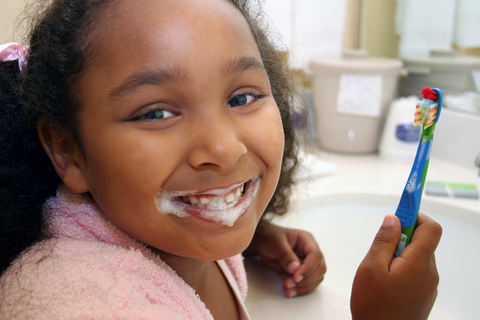. . . and my daughter and her imperfect teeth

Last week, my children had dental check ups. My son’s perfect teeth are the good news. My daughters mouth full of cavities is the bad news.
When the dentist sat down with me to ask about the differences between them, he asked interesting questions.
Did they grow up in different houses or cities for their first three years?
No, they both were born and lived in the same house until they were 5 and 8 years old.
Was our city water fluoridated?
It was, though we filtered our water. He said he could see in my son’s teeth that he had fluoride, but he couldn’t see it in my daughter’s. I kept in mind the case against fluoride throughout their regular visits with a dentist.
Do they have different eating, snacking, or brushing habits?
Not as far as I can tell. They eat the same thing every day, get the occasional candy at the same time, and both brush their teeth twice daily with the same toothpaste. (Though they have both been scared straight into brushing after every meal. Finally!)
We could come up with no significant differences in environment or actions, but their teeth are very different.
Maybe he has been brushing better or more often than she has. Maybe she’s just older and has been carrying her adult teeth just that much longer.
I kept thinking about differences as I drove my shiny smiling children home. I thought of two more differences. My daughter nursed 2.5 years longer. Also, during my second pregnancy with my son, I was very aware of trimester-by-trimester development and nutrition. I ate well during both pregnancies, eating no processed sugar either time. My husband and I prepared for both pregnancies by eating carefully nutritious diets and taking vitamins. But, I was hyper aware of nutrition during the second pregnancy.
During my second pregnancy I drank nutrient-dense green juice every day, and I ate many of my meals from the best cookbook I’ve ever owned, The Pregnancy Cookbook by Hope Ricciotti, M.D., and Vincent Connelly. They are a wife and husband team. She’s an obstetrician, and he’s a chef. Their explanations of why we should eat specific foods at specific times during pregnancy really struck me. I remember in particular reading about the development of teeth and bones in a fetus by about the 20th week. We need calcium during that period of time, and we need to make sure that we eat foods that are high in calcium (bok choy, kale, broccoli, blackstrap molasses, legumes, mangoes) together with foods that aid in calcium absorption (boron in fresh fruits) and that we don’t eat those foods that block calcium absorption (oxalic acid in spinach and swiss chard or phytic acid in outer layers of whole grains).
At the time, I was helping to teach a university anthropology course on native nutrition, teaching students about the work of Dr. Weston A. Price, a dentist whose long-term research on teeth and bones reveals industrialized foods as one of the serious dietary culprits that result in bad teeth. Dr. Price had very strong opinions about dental health.
Seeing and reading Dr. Price’s clear evidence in favor of slow foods, traditional foods, and stone age diet encouraged me to be very careful about everything I ate as my son was developing and growing.
I still haven’t gotten to the bottom of the mysteries of my children’s teeth, but I do suspect my pregnancy nutrition as one of the reasons for the difference.
If you are pregnant or may soon become pregnant, consider your nutrition very carefully. I highly recommend The Pregnancy Cookbook. The recipes that are particularly delicious. These are not simplistic meals, but I didn’t have trouble finding the ingredients in my local store.
If your children need encouragement to care well for their teeth, you will find many resources to teeth children about good dental health from the Canadian Dental Association and the American Dental Association.
Image © Photoeuphoria | Dreamstime.com
